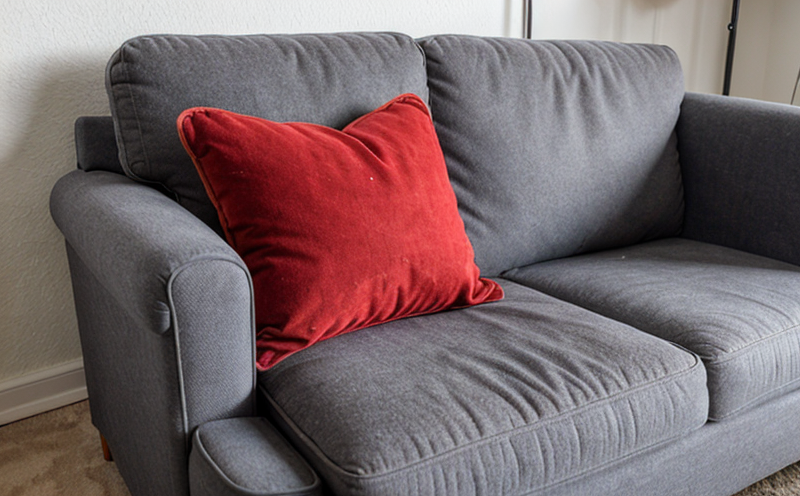JIS L 1096 Textile Testing for Upholstery Fabrics Strength and Abrasion
The JIS L 1096 standard is a key requirement in the Japanese furniture industry, specifically addressing the durability of upholstery fabrics. This test assesses both tensile strength and abrasion resistance, which are critical factors in ensuring that upholstery materials withstand the rigors of daily use without compromising on comfort or aesthetics.
The JIS L 1096 textile testing method is designed to simulate real-world conditions under which upholstery fabrics might be subjected. It helps manufacturers ensure their products meet stringent quality benchmarks and can be relied upon for long-term performance in various environments, from residential settings to commercial applications such as office seating or public transportation.
The test involves a series of mechanical actions performed on the fabric samples to evaluate how they hold up against stress and wear. This includes pulling the sample through an abrasion device at specified speeds and pressures to determine its resistance to fraying or tearing. Additionally, tensile strength is measured by stretching the material until it breaks.
Preparation of specimens for this test is crucial; samples must be cut according to precise dimensions outlined in JIS L 1096. These include width, length, and thickness specifications that are essential for accurate testing results. Proper sample preparation ensures consistent and repeatable outcomes, which is vital for reliable quality control.
Once prepared, the specimens undergo rigorous mechanical testing using specialized equipment designed to replicate the forces encountered during typical use. The abrasion test uses a rotary machine with a specified weight and speed while measuring resistance through force measurement devices. For tensile strength testing, a universal testing machine applies controlled tension until failure occurs.
Reporting of results follows strict guidelines set forth by JIS L 1096. This includes detailed documentation of all parameters tested along with graphical representations such as stress-strain curves and force-elongation plots. Such comprehensive reporting allows manufacturers to understand exactly how their fabrics performed during testing, identifying any weaknesses that may need addressing in future product iterations.
This testing process not only enhances the durability but also adds value by ensuring consistent quality across all products manufactured according to this standard. By adhering strictly to JIS L 1096 specifications, furniture manufacturers can gain a competitive edge in markets where high-quality materials are highly valued.
- Ensures compliance with international standards
- Improves product durability and reliability
- Facilitates easier entry into Japanese markets
- Reduces costs associated with poor quality control
- Promotes brand reputation among discerning consumers
Benefits
The benefits of JIS L 1096 textile testing are numerous and far-reaching. Compliance with this standard enhances the durability and reliability of upholstery fabrics, leading to prolonged product lifespan. This not only improves customer satisfaction but also contributes significantly to reducing waste and environmental impact.
By adhering strictly to these specifications, manufacturers gain a competitive advantage in capturing lucrative Japanese markets known for their stringent quality standards. Moreover, successful completion of JIS L 1096 certification can enhance brand reputation among consumers who place high value on product longevity and quality.
For procurement departments, ensuring suppliers meet such stringent criteria streamlines supply chain management while minimizing risks associated with substandard materials. Furthermore, the detailed reports provided by this testing process enable informed decision-making regarding material selection and potential improvements for future product iterations.
Quality and Reliability Assurance
The importance of quality and reliability assurance in upholstery fabric production cannot be overstated. In an industry where comfort, aesthetics, and longevity are paramount, ensuring that every aspect of the manufacturing process adheres to strict standards is crucial.
JIS L 1096 textile testing plays a pivotal role in this regard by providing objective data on tensile strength and abrasion resistance. This information allows manufacturers to identify areas where improvements can be made, thereby enhancing overall product quality. Regular testing ensures that all batches meet the required standards consistently, reducing the risk of defects reaching end consumers.
Moreover, compliance with JIS L 1096 fosters a culture of continuous improvement within companies. It encourages them to stay abreast of advancements in textile technology and incorporate them into their processes whenever possible. This proactive approach ensures that products remain relevant and appealing in an ever-evolving market landscape.
International Acceptance and Recognition
The international acceptance and recognition of JIS L 1096 textile testing underscores its significance beyond just the Japanese market. Many global players recognize the importance of meeting this standard, as it signifies a commitment to delivering high-quality products that can withstand harsh conditions.
Compliance with JIS L 1096 is often seen as an assurance of consistent quality across all production batches, regardless of location or facility. This aligns closely with broader trends towards sustainable manufacturing practices and responsible sourcing, making it attractive for companies seeking to expand their reach into international markets.
Recognition from reputable organizations further strengthens the credibility of JIS L 1096 as a benchmark for textile durability testing. Such recognition helps build trust among consumers who value transparency and authenticity in product information.





